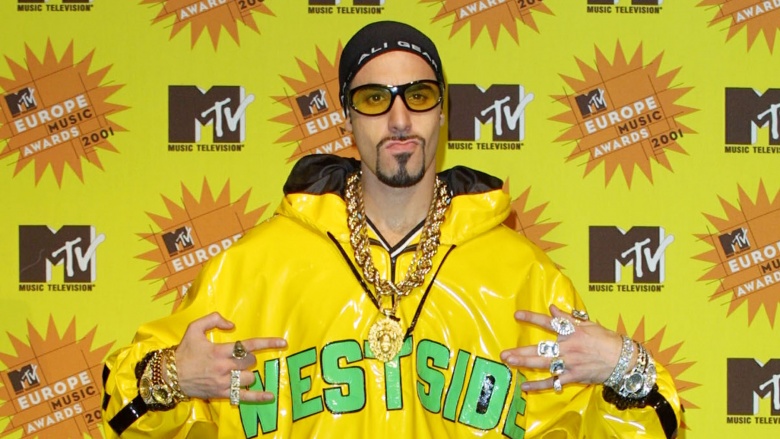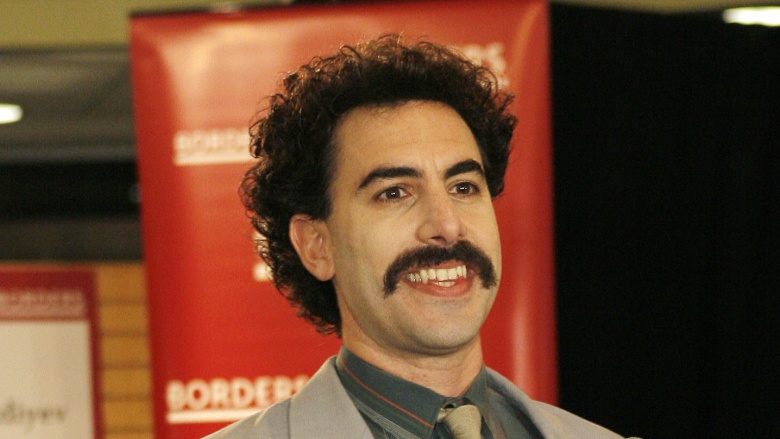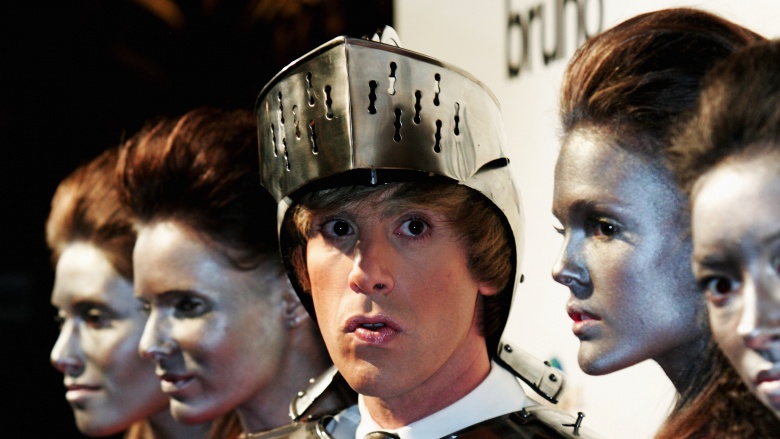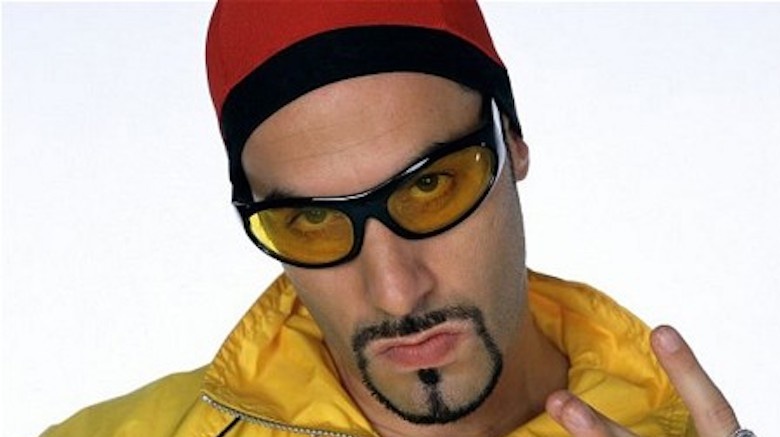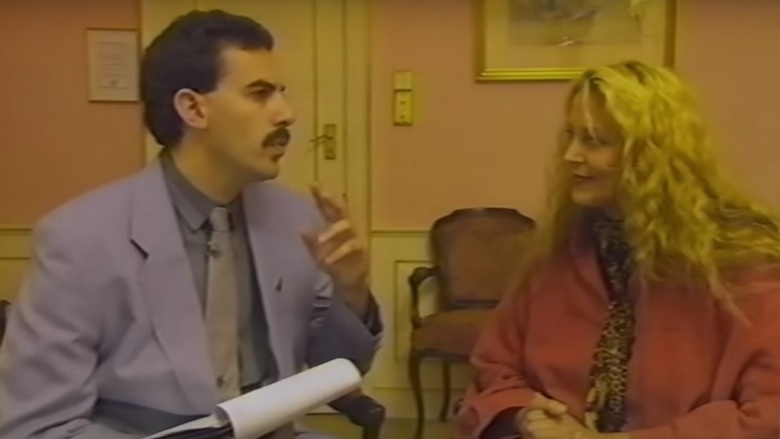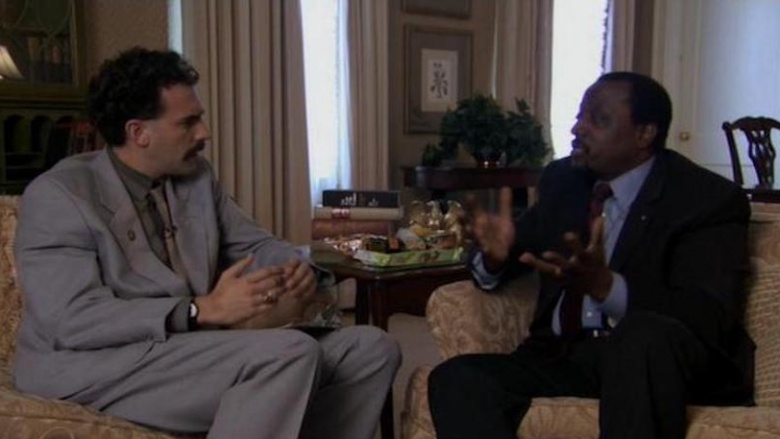The Untold Truth Of Da Ali G Show
In the early 2000s, Cambridge-educated comedian Sacha Baron Cohen unleashed Da Ali G Show, first on British television and then on HBO in the States. Deep in character as three bizarre, unforgettable, and truly stupid reporters, Baron Cohen interviewed real, unsuspecting people, in the process brutally satirizing modern culture and exposing prejudice. Here's a very niiiiiiice look at how Baron Cohen revolutionized comedy with Ali G, Borat, and Brüno. Booyakasha!
The origins of the Ali G character
In the mid-'90s, Baron Cohen started his career in entertainment by hosting obscure, youth-oriented shows on British satellite TV, including Pump TV, Talk TV, and F2F. It was at the latter where a director named Mike Toppin asked him to develop characters—Baron Cohen would host the show, and then throw to pre-taped segments of his creations interviewing real people. One of the first creations was an upper-middle-class and incredibly stupid white reporter who desperately wanted to be perceived as a tough, patois-speaking "gangsta" who went by the name MC Jocelyn Cheadle-Hume, a play on the name of the English town Cheadle-Hulme. When the character propelled Baron Cohen to a job making similar comedy bits at the more prominent Channel 4, producer Harry Thompson gave MC Jocelyn Cheadle-Hume a new name: Ali G. He figured if the character had an "ethnic" sounding handle, interview subjects would be less likely to leave a bad interview out of the fear of appearing racist on camera. (By the way, Ali G's full name is Alistair Leslie Graham.)
The origins of Borat
Baron Cohen kept developing characters, including a dim Eastern European reporter named Alexi Krickler, who hailed from the nation of Moldova (and later Albania). Krickler, who'd ultimately evolve into Borat, got his start when Baron Cohen went to a depressed Russian town for a "beach vacation" his friend won and met a doctor who talked the way Borat ultimately would. (The doctor also freely and openly discussed male genitalia.)
Baron Cohen and producer Dan Mazer made Borat hail from Kazakhstan because it was a country they figured the vast majority of people didn't know anything about, leaving them free to make the character as outlandish as they liked. However, on a few occasions, people Borat interviewed pointed out that his catchphrase-like greetings of "jagshemash" and "gendobrie" sounded Polish. They are—Baron Cohen as Borat would just say that the words were the same in Polish and Kazakh.
For both the TV and movie version of Borat, scenes featuring the reporter at home or with his family were filmed in Romanian villages. This is in part because Kazakhstan is in Asia, not Eastern Europe, and so the people there "looked nothing like Borat," according to Mazer. In exchange for letting them film in the village, the production gave the town a live pig. It's the same one Borat is shown eating later on.
The Origins of Brüno
In 1998, Baron Cohen was hired by England's Paramount Comedy Channel to make pre-taped bits. He pitched a character who'd cover London Fashion Week: Brüno, a fashion-and-celebrity obsessed reporter who would scream at and beg celebrities for an interview, only to promptly forget his questions if they agreed. As he'd later use Borat to trick people into revealing anti-Semitic biases, Brüno was intended to expose and satirize homophobia (as well as the superficiality of celebrity culture).
How Cohen got his own shows
Although he'd built an audience, Baron Cohen remained only a cult figure and he didn't feel like his career was going anywhere, to the point that he once considered moving to the low-cost-of-living nation of Thailand permanently. In the nick of time, he was called back to London for an audition for Channel 4's nightly satirical comedy The 11 O'Clock Show. (Think The Daily Show meets SNL.) What got Baron Cohen the job was a tape he submitted of himself as Alexi Krickler goading participants in a pro-fox hunting rally in Hyde Park. Baron Cohen-as-Krickler darkly suggests that British prison inmates could be hunted down instead of foxes as way to solve prison overcrowding; the real fox hunters tell him that's "a good idea." Baron Cohen was hired for The 11 O'Clock Show, where Ali G, Borat, and Brüno made regular appearances from 1998 until the series was canceled in 2000.
The first season of Da Ali G Show was very different
The 11 O'Clock Show may have ended, but Baron Cohen's characters were so popular that a spinoff was quickly put into production. Da Ali G Show debuted on British TV in 2000, although its format was initially very different from the Ali G Show that would air on HBO. Remote segments where he'd interview unsuspecting politicians and public figures in character were included, but so were in-studio talk show segments, a hip-hop dance team called the TNT crew, monologues, and musical performances (which Ali G insinuated himself into), all in front of a live studio audience. It didn't get great reviews, but it didn't matter—Baron Cohen's characters became so well known in England that Baron Cohen and his cohorts couldn't find anybody to dupe anymore. To continue to make the show, they had to move production to the U.S., where nobody would know who they were. Thus the version of Da Ali G Show that aired on HBO from 2003 to 2004—shot in America and with each episode consisting of a taped interview plus one Ali G segment, one Borat segment, and one Brüno segment.
How they got the interview
Da Ali G Show wrangled interviews with a number of influential public figures, from astronaut Buzz Aldrin to 60 Minutes crank Andy Rooney to attorney general Dick Thornburgh. Baron Cohen and his associates arranged the interviews through a very precise mixture of flattery, obfuscation, and manipulation. For example, ABC journalist Sam Donaldson told Slate his assistant received a letter of gushing praise, asking for Donaldson's assistance in a documentary. That way they could get around the eagle-eyed gatekeepers of publicity departments. Another subject was told that they'd be participating in a six-part series for European television about life in the United States. The contracts generally came from a production company such as "Somerford Brooke Productions" or "United World Television," which while totally fake, happened to have the same address as TalkbackThames, Da Ali G Show's actual production company.
Even if the interview subjects seemed uncomfortable when they arrived, Baron Cohen committed the interview to tape before they had a chance to get out. After the subject had been placed in position on set, checked for lighting, and gotten their makeup on, Baron Cohen-as-Ali G would conduct a brief "pre-interview" with silly questions like "how do you spell your name?" and "how do you write this letter of the alphabet?" While they were still mildly bewildered, Baron Cohen would take his seat and start the interview proper.
He rarely breaks character
Baron Cohen is a remarkably talented improviser who always stayed in character on the show—almost. Producer Dan Mazer can only remember a couple of times that Baron Cohen started breaking character by laughing. One instance occurred when, as Borat, he asked about "doing a dirt" in a urinal at an American bowling alley. The other happened when Ali G was interviewing General Brent Snowcraft about terrorism and got "anthrax" and "Tampax" mixed up.
The crew had to be in on the joke, too
Interview subjects wouldn't be fooled into thinking Baron Cohen's characters were real if everyone involved wasn't committed to making it look legitimate. That meant the camera crew that filmed Ali G, Borat, and Brüno had to do a little acting, too. Petra Heskell, who met Borat when he visited her London Flirting Academy, reported that the film crew acted like they were "being lumbered with this stupid foreign guy." Mazer says that's part of the bit—and that they constantly apologize to interview subjects for the reporter.
When guests of the show got mad
A big part of the Borat character is a vicious streak of anti-Semitism. It's meant to send it up, of course, as Borat tricks politicians and regular people into being comfortable enough to reveal their own nasty prejudices on film. (Baron Cohen himself is a devout Jew who keeps both kosher and the Sabbath, not working from Friday evening to Saturday evening.) One person he fooled—and subsequently angered—was Mississippi congressional candidate James Broadwater. Borat said that the interview was for Kazakhstani television, to inform viewers about the American political process, and tricked Broadwater into stating that Jewish people who didn't convert to Christianity would go to Hell. After it aired and Broadwater was made aware of the ruse, he released a statement decrying the show, calling it an example of how the "liberal, anti-God media" needs stricter FCC control while insisting he's not anti-Semitic because he had an "I am a proud friend of Israel" button on his website.
Borat had to prove his "authenticity" as a genuine European reporter, so he'd offer a tin of fish, a supposedly Kazakh cigarette, or a giant kiss. In keeping with the anti-Jewish act, during one interview, he gave conservative politician Alan Keyes a bone that he said was "the rib of a Jew." Fearing he just got caught on camera doing something that would make him look bad, Keys panicked, took off his lapel mic, and stormed out. Producers convinced him to come back and said he'd been given a "dew's rib." That doesn't make any sense...but Keyes stayed and finished the interview.
The Trump feud
A notable plot point in Baron Cohen's 2016 scripted comedy film The Brothers Grimsby concerns a fictional version of Donald Trump being forcefully infected with HIV—the latest blow in a lingering feud between Baron and the real estate magnate and reality television star. In 2003, Baron Cohen interviewed Trump as Ali G when he was trying to land investors for a ridiculous invention called Ice Cream Gloves—designed to protect the hands from both melted ice cream and the cold of the ice cream. Just a couple of minutes into the segment, Trump realized he was being had and walked out. Trump proudly called back to that moment in 2012, when he tweeted "I never fall for scams. I am the only person who immediately walked out of my 'Ali G' interview."

